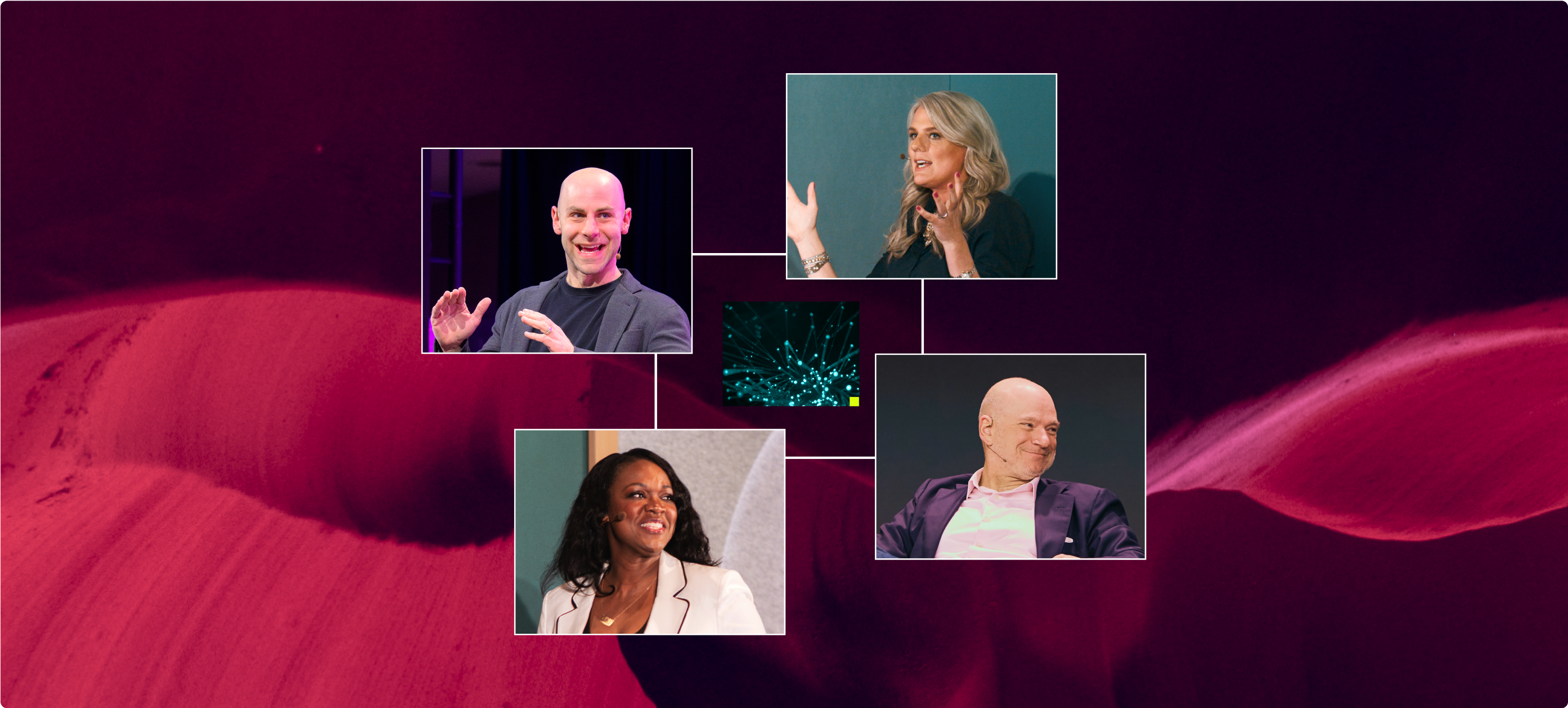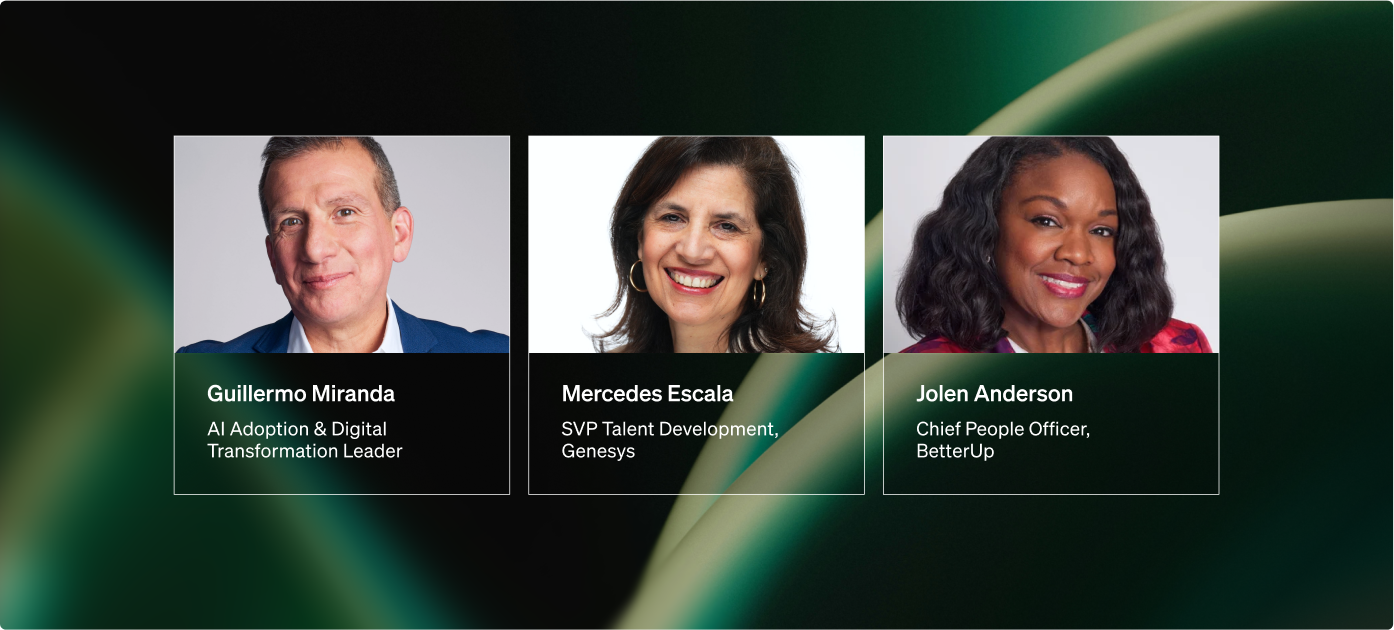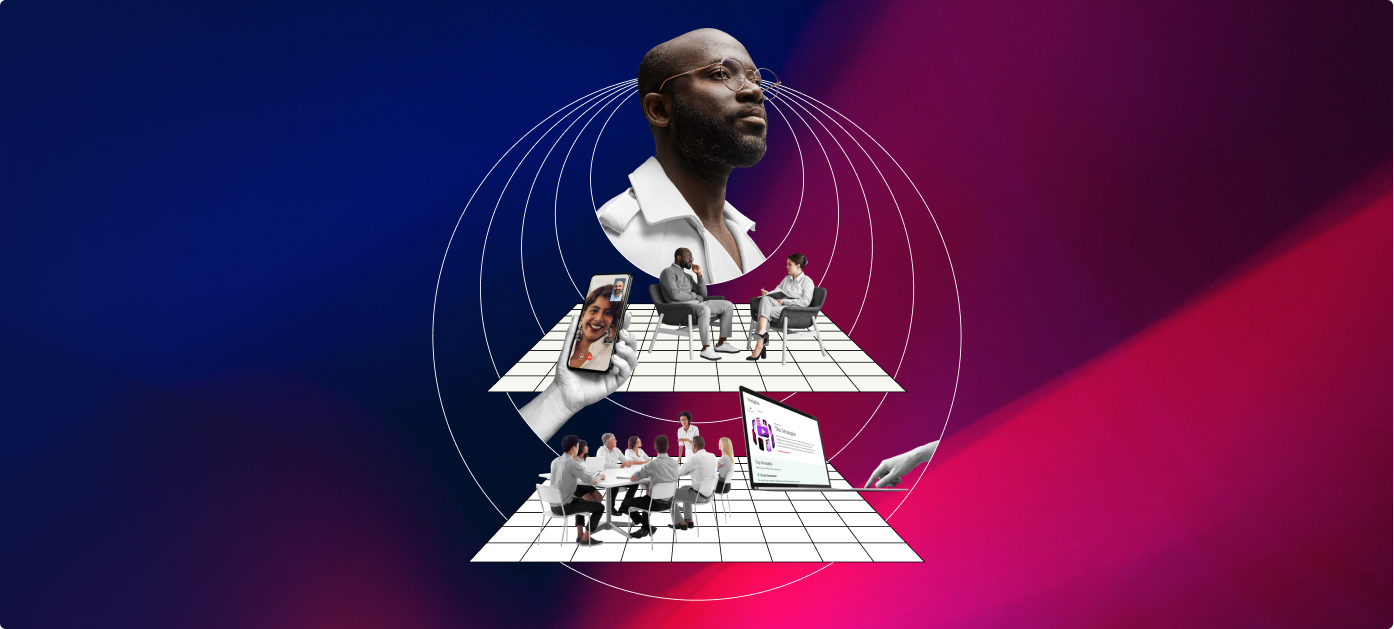A recent panel discussion featuring renowned organizational psychologist Adam Grant, MIT principal research scientist Andrew McAfee, and Moderna Chief People and Digital Technology Officer Tracey Franklin explored the critical implications of AI integration in the workforce. The experts shared actionable insights for HR leaders navigating this transformation, in a conversation facilitated by BetterUp's Chief People and Community Officer, Jolen Anderson.
A workforce at a breaking point
Jolen Anderson opened the session by underscoring a "quiet but urgent shift in the workforce," pointing to increasingly fragile performance trends. She shared startling data from over 410,000 employees, revealing that new hires consistently struggle in areas like collaboration, adaptive performance, and task completion during onboarding—a trend worsening annually. The crux of the issue, according to Anderson, lies beyond simple work ethic: "The fuel behind performance is running dry," she stated, emphasizing the strain on motivation, optimism, and agency in the face of rapid change.
Anderson emphasized that successful AI adoption requires understanding the human factors alongside the technology. She cited research from BetterUp Labs and Stanford Social Media Labs identifying two critical mindsets that determine success: optimism about AI's potential and a sense of agency in using it. When both are present, employees become "Pilots"—empowered actors who drive innovation. When absent, they become "Passengers"—disengaged and overwhelmed by change.¹ Her conclusion was direct: "AI can't lead change. The future of leadership belongs to those who know how to activate human agency in an AI-driven world."
The shift from ability to agility
Adam Grant added depth to Anderson's opening, stating: "We used to think about the currency of success as being ability; increasingly, it's agility." He referenced the concept of "cognitive debt"—a phenomenon where, as employees rely more on AI tools, their engagement and creativity can unintentionally suffer. The challenge for leaders, according to Grant, lies in ensuring employees maintain a sense of contribution and creative ownership, even as technology streamlines tasks.
He underscored the importance of adaptability and agile thinking, presenting these traits not merely as desirable but essential for navigating the demands of modern workplaces. In transitioning to Andrew McAfee's perspective, Grant emphasized his optimism in McAfee's expertise on the intersection of AI implementation and organizational agency.
Balancing AI adoption with human agency
Andrew McAfee centered his discussion on the delicate balance organizations must strike when integrating AI. His insights focused on preserving employee agency amidst widespread tech adoption. He posed a critical question: "Are you making people feel more involved, giving them higher agency, more empowerment in their work, or are you having them feel like cogs in some gigantic and increasingly automated machine?"
McAfee stressed the importance of thoughtful rollout strategies—not just for business outcomes but to ensure employees feel engaged, empowered, and supported in the transition. By coupling rapid feedback mechanisms and strong coaching support, organizations could turn AI into an opportunity for growth rather than an alienating force.
He also addressed the concept of "cognitive debt" that came out of MIT’s June 2025 research, Your Brain on ChatGPT, explaining its risks and adverse effects. For example, employees over-relying on AI might lose a sense of creativity or feel disconnected from their contributions. McAfee highlighted examples of successful AI coaching frameworks, where rapid feedback and live demonstrations mitigate these risks, helping employees embrace AI as a partner, not a replacement.
Moderna's AI adoption framework
Tracey Franklin shared how Moderna is integrating HR and digital/IT functions to drive AI adoption from within. Instead of top-down mandates, her team focused on embedding AI into existing forums and workflows: “We built it into existing forums they were already coming to.” By framing AI as a solution to workload and staffing challenges, they sparked genuine interest and momentum across the organization.
For Moderna, AI adoption wasn't solely about productivity. Franklin stated, "It's really about fundamentally rethinking how work gets done." She framed AI not as an efficiency tool but as an enabler of transformation—creating workflows where bots and humans collaborate seamlessly. This vision was underpinned by proactive committee-driven collaboration across HR, IT, and finance, which laid the groundwork for sustained change.
Franklin also highlighted the importance of measuring adaptability and growth mindset during such transitions. Working with BetterUp, Moderna has seen dramatic improvements in areas like self-awareness, self-efficacy, and optimism—values essential for sustaining performance in a fast-changing world.
Actionable advice for HR leaders
Throughout the session, the speakers offered practical advice for HR leaders preparing to adopt AI:
- Frame AI thoughtfully: Tracey Franklin cautioned leaders against framing AI adoption as a cost-cutting measure: "No one gets excited about that. It's about innovating and making skill sets stronger and people more marketable."
- Institutionalize AI goals: Franklin suggested making AI an explicit organizational goal, embedding it into OKRs and strategic conversations.
- Push for adoption: HR, according to Franklin, must act as architects of change. "If your leadership is not adopting this, push hard," she advised, citing today's lag in adoption as an urgent risk.
- Plan beyond rollout: Organizations need to prepare for the iterative nature of AI: "The finish line should be the start of the next race," Franklin emphasized.
Closing reflections
The discussion ended on a high note, with optimism about the medium-term future of AI in the workforce. As Anderson observed, much of the session avoided speculative long-term predictions, focusing instead on actionable insights and strategies. The panel's resounding takeaway was clear: AI adoption is inevitable, but how organizations integrate it—with empathy, agency, and adaptability—will determine whether it becomes a force for empowerment or alienation.
For HR leaders, this session offered an invaluable playbook for navigating the AI frontier, balancing innovation with humanity, and fostering cultures where both technology and people thrive.
BetterUp’s AI-powered platform builds the psychological readiness, adaptability, and resilience today’s workforce needs to thrive through constant change—delivering the infrastructure for continuous growth and transformation at scale.
The Human Transformation Platform
Process doesn't change your business. People do. Our platform removes the guesswork from developing your people at scale and delivers growth that's proven, predictable, and precise.
The Human Transformation Platform
Process doesn't change your business. People do. Our platform removes the guesswork from developing your people at scale and delivers growth that's proven, predictable, and precise.















